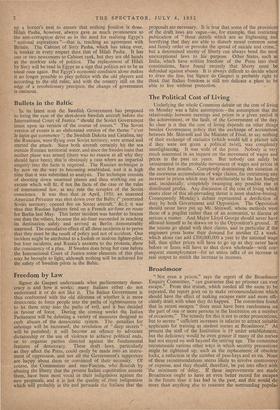Signor de Gasperi understands what parliamentary demo- cracy is and
how it works; -many Italians either do not understand it or do not like it. The Italian Government is thus confronted with the old dilemma of whether it is more democratic to force people into the paths of righteousness or to let them stray into the paths of evil, and it has decided in favour of force. During the coming weeks the Italian Parliament will be debating a variety of measures designed to curb abuses of the democratic system. The penalties for sabotage will be increased; the revelation of " deep secrets " will be punished; it will become an offence to advocate dictatorship or the use of violence to achieve political ends, or to organise parties directed against the fundamental features of democracy. These draft laws, , particularly as they affect the Press, could easily be made into an instru- ment of oppression, and not all the Government's supporters are happy about them or convinced of their necessity. Of course, the Communists and neo-Fascists, who flourish by abusing the liberty that the present Italian constitution assures them, have been most vocal in their indigdation against the new proposals, and it is just the quality of their indignation which will probably in the end persuade the Italians that the proposals are necessary. It is true that some of the provisions of the draft laws are vague—as, for example, that restricting publication of " those details which are so frightening and horrifying that they are able to disturb moral common sense and family order or provoke the spread of suicide and crime," but a determined enemy of liberty can always bend the most unexceptional laws to his purpose. Other States, such as India, which have written freedom of the Press into their constitutions, have found recently that liberty must be defended against abuses. It is always difficult to decide where to draw the line, but Signor de Gasperi is probably right to think that Italian freedom is still too delicate a plant to be able to live without protection.


























































 Previous page
Previous page